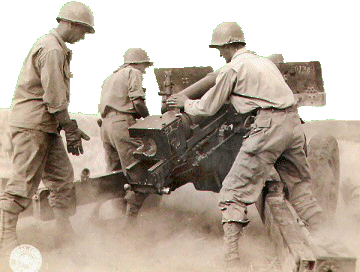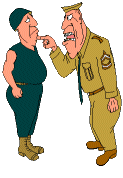by David Thibodeau
Over hill, over dale, we have hit the dusty trail
As those caissons go rolling along.
Counter march, right about, hear those wagon soldiers shout
As those caissons go rolling along,
For it's "Hi, hi hee, in the Field Artillery,
Call out your numbers loud and strong! An where'ere we go, you will always know,
That those caissons are rolling along,
That those caissons are rolling along.
old Field Artillery song
I took 17 weeks of Hi. hi, hee! Field Artillery basic training in summer, 1943 at Fort Bragg. NC, a military reservation bigger than a lot of counties. The training lasted from mid-August to mid-December. I was in the best platoon, in the best battery, in the best battalion, in the best training regiment in all of Fort Bragg, C-2-1, or so we were told.
What you learn in the US Army, you learn for a lifetime. I learned that our 105 mm howitzers were the main support of the Infantry. I learned that they fired semi-fixed ammunition, the high explosive shell weighed 33 pounds and the propellant case with the 7 powder bags weighed 11 pounds, for a total of 44 pounds. The fuse at the tip of the shell had fulminate of mercury to ignite the charge. A ball-bearing device armed\ the projectile using centrifical force produced by the rotation in the rifling in the tube of the gun. The howitzer had a maximum range of 12.500 yards. The four guns in a battery could easily put 100 rounds of high explosives in steel jackets on a target in a couple of minutes, with great accuracy. The jackets shattered into steel shards and chunks and splinters to kill anyone in the target zone, ripping through their bodies and their helmets.

105mm Howitzer
We marched and drilled, took 5 miles speed marches, learned to fire our US Carbine Caliber 30 M-1's, and took classes on land mines, booby traps, hand grenades, hand-to-hand fighting, ran through obstacle courses, assault courses, calisthenics, military courtesy, did overnight bivouacs, field problems, scouting, camouflage, and we were turned into soldiers.
 I learned in military courtesy class that you never salute unless you are in uniform. I couldn't believe my eyes when President Ronald Regan, who should have known better, returned hand salutes while wearing a business suit. Clinton does the same, but he knew no better, was never in the armed forces and he makes his own rules anyhow. No matter if he is commander in chief, he doesn't salute unless in uniform. No more so than he would wear polka dot swim trunks in a church service.
I learned in military courtesy class that you never salute unless you are in uniform. I couldn't believe my eyes when President Ronald Regan, who should have known better, returned hand salutes while wearing a business suit. Clinton does the same, but he knew no better, was never in the armed forces and he makes his own rules anyhow. No matter if he is commander in chief, he doesn't salute unless in uniform. No more so than he would wear polka dot swim trunks in a church service.
We learned in hand-to-hand combat that the cowboys in the movies had it all wrong. After they knocked their opponent to the ground, they reached down and picked the man up in order to punch him again. The army taught us at Fort Bragg that after your opponent is down, you stomp on his face, and keep on stomping.
It was hot that summer at Fort Bragg. I was lonely and homesick, but never let on in my letters.
We were like prisoners. Passes to nearby Fayetteville were hard to get, and were good for only a few hours on weekends. Fayetteville was a small town, and couldn't absorb thousands of sex-starved, beer-starved, soldiers. The townsfolks were worried about their wives, their mothers, their matrons and their maids, as Shakespeare once wrote. I rarely went to town. The people seemed hostile. The only places I went were the Post Exchange and the theater.
Saturday mornings we had tough inspections, so we spent a lot of time shining our shoes and our carbines. Some guys seemed to get obsessed with shoe-shining. The stuff you displayed in your footlocker at inspection was never used, except for show. Your stuff you used, socks, towels, etc. were out of sight. The army doesn't go for original thinkers. If you want to question the procedures or "do your own thing," you are in the wrong organization. It took me a while to learn that. 'Our platoon Sergeants were men with hair-trigger tempers, pure rage always close to the surface. They sifted and sorted, and windowed thousands of men to get the toughest non-coms they could find. My Sergeant was a ramrod southerner named Travis W. Barnes. Eyes like an eagle, unsmiling, temperament of a Doberman Pinscher, jut-jawed, ever vigilant, intolerant of the least deviations, in short, the kind of man needed to prepare us for what was ahead, for there was plenty of war left for everybody by the end of that December 1943.

